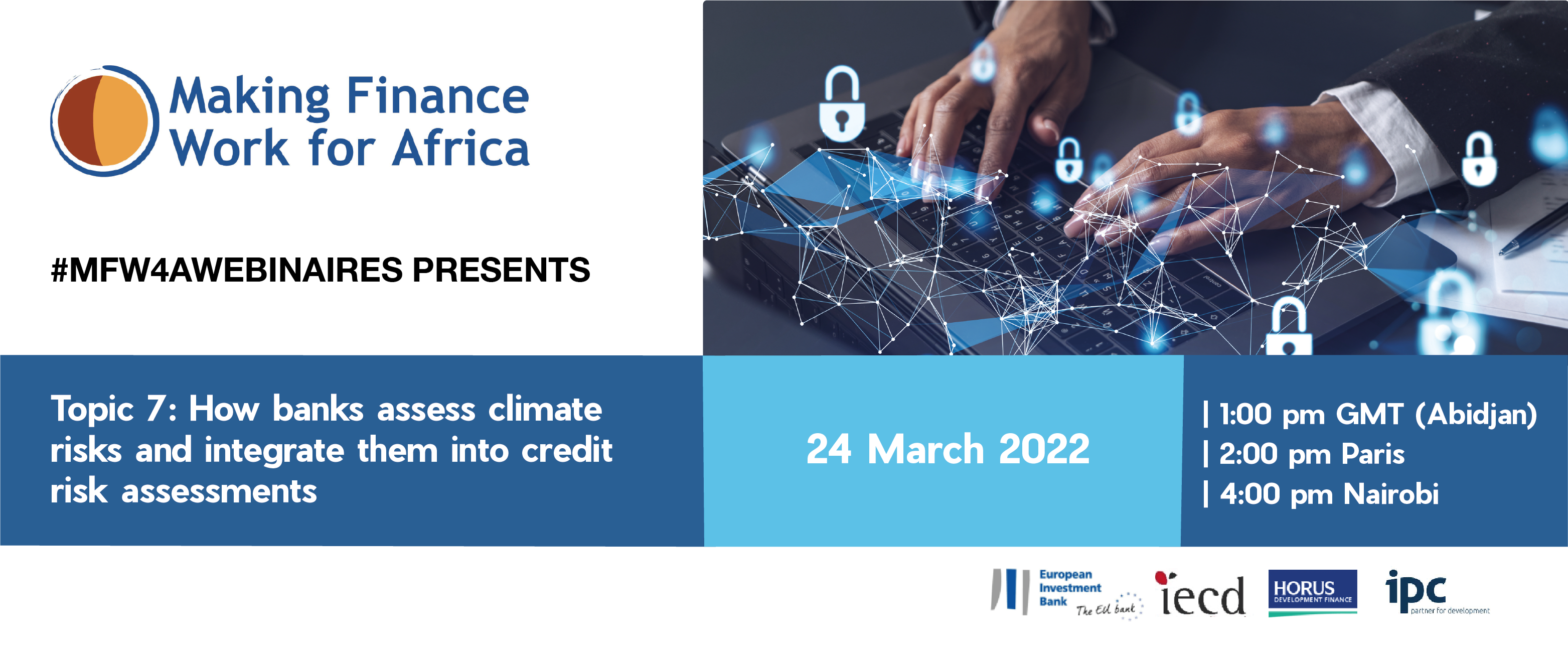The EIB West and Central Africa SME Banking and Microfinance Academy 2022
Webinar series – Learning event
Topic 7: How banks assess climate risks and integrate them into credit risk assessments
24 March 2022, 01 pm GMT (Abidjan) / 02 pm (Cotonou, Paris, Frankfurt, Douala, Kinshasa)/ 03 pm (Lusaka, Harare, Johannesburg) / 04 pm (Addis-Ababa, Nairobi)
1. Background and Introduction
Within the context of the European Investment Bank (EIB) Technical Assistance Financial Sector Programme for West and Central Africa, Making Finance Work For Africa (MFW4A) and the IPC, Horus and IECD Consortium are hosting a series of webinars for banks and microfinance institutions (MFIs) operating in these regions. EIB’s mission clearly aims to:
- to Micro Small and Medium Enterprises (MSMEs) in line with banking and microfinance institutions (MFIs) regulatory requirements, and
- (PFIs) deliver financial services on a credit worthiness basis, proactively managing their loan portfolios including present and future Non-Performing Loans (NPLs) and ensuring the safety of customer deposits.
Climate change is the long-term disruption in seasonal weather patterns that are caused by global warming. What would be their long-term effects on businesses and the financial system, and how should their impacts be managed?
This seventh webinar will explore: “How banks assess climate risks and integrate them into credit risk assessments”
According to the findings of the EIB survey conducted in collaboration with MFW4A for the 2021 Finance in Africa report, “close to 70% of banks in sub-Saharan Africa see green finance as an attractive lending opportunity. Nearly 55% actively look at climate change when making strategic plans. And more than 40% of African banks employ staff to focus on renewable energy. However, only around 10% have tailored their products to serve green finance”. The fundamental question is, what is inhibiting African banks from engaging more in green lending?
Climate-related risks are mainly divided into two basic sets: physical risks from more frequent and severe meteorological and hydrological events, and transition risks from the process of reducing carbon dioxide emissions to mitigate global warming. Climate-related risks affect all dimensions of credit risk—a borrower’s capacity to repay its debt as well as the capital and collateral that back the loan. For financial institutions, credit risks can materialize directly, through their exposures to corporations, households, and countries that experience climate variations, or indirectly, through the effects of climate change on the wider economy and feedback effects within the financial system. Exposures manifest themselves through increased default risk of loan portfolios or lower values of assets. Transition risks materialize on the asset side of financial institutions, which could incur losses on exposure to firms with business models not built around the economics of low-carbon emissions
Climate-related risks are expected to be included in all relevant stages of the credit-granting process and credit processing. Specifically, institutions are expected to critically uncover how climate-related risks affect the borrower’s default risk.
On the back of this webinar, the panellists will share their useful experiences on how banks and MFIs adapt their credit/loan approval processes to integrate climate change considerations and incentivize sustainable investments with a focus on SMEs. The panellists will also highlight the key steps Enterprise Service Management (ESM) Framework and how climate-related risks can be mainstreamed in financial sector activities.
2. Outcome
At the end of the webinar, participants should have gained awareness and basic knowledge about:
- How to assess climate change risks?
- Which approach to take in integrating climate risks into credit risks assessments?
- How to adapt products and services to more climate action?
3. Event format and audience
The webinar will last about 90 minutes and be held in French with simultaneous translation in English. It will combine presentations followed by a panel discussion and Q&A session.
The target audience comprises middle and senior managers of banks and financial institutions operating in West & Central Africa. At the end of the webinar, key takeaways will be summarized in a post-event report and shared with participants and other stakeholders within the African financial ecosystem. A digital version will also be posted on MFW4A portal for public dissemination.




